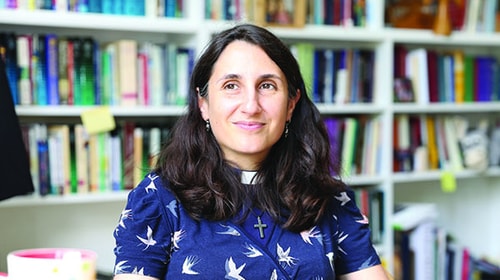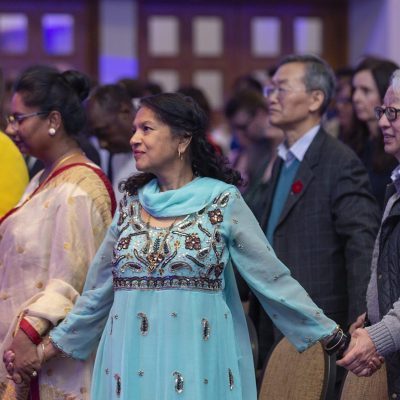Rev Isabelle Hamley is the Archbishop of Canterbury’s chaplain. She leads prayers at Lambeth three times a day, when all meetings stop, and goes on the road with the Archbishop. Here, she talks to Hazel Southam about her new role and the importance of prayer.
You’re originally from France. When you did your British citizenship, you were asked, ‘Who is the Archbishop of Canterbury and where does he live?’ At that stage, could you have imagined being his chaplain?
Not in my wildest dreams! The Archbishop of Canterbury was my boss, in a very distant way. I saw him in The Church Times and the news, but that was about it.
So what’s it been like, taking on the role of Chaplain to the Archbishop of Canterbury?
It’s been scary in some ways and it also feels very surreal. You have very strange days of meeting all kinds of people and hearing about all kinds of things. I have been surprised by the level of political involvement and how intimately involved in the life of the nation the Archbishop is.
It is incredibly intimidating and I worry about everything. I never feel good enough. I ask myself, how can I do this? Everything matters. You are in the public eye. You have to check before everything goes out as people are ready to distort your words, or misunderstand, perhaps wilfully. That’s quite difficult.
On the other side, the life of a vicar is quite lonely and here I work with a fantastic team of people, working collaboratively. These people are so gifted and talented, it’s a real joy.
Is there a typical day?
There really isn’t a typical day and if you think that there is, then something will happen and the diary will change. That’s the joy of it. We pray three times a day in the chapel. Normally, I’m there unless I’m out and about with the Archbishop. The meetings all stop for prayer.
Why is that?
If we don’t pray, there’s no point in doing anything that we do here. We have to be rooted in prayer so that we can be rooted in God and rooted in the story that we are trying to tell. It’s easy to be seduced by the shiny, glittery things, because we meet people who are famous. You can get swept up in that. Remembering that you can’t do anything without Jesus is important in a place like this.
The Archbishop of Canterbury has made prayer a focus, not just for himself, but for Britain. Why is that?
He has lots of duties and there is little time for the things that he personally wants to do. But in that time he wants to focus on evangelism, reconciliation and prayer and the renewal of the religious life. As his chaplain, I lead the work at Lambeth on prayer. We have done things on Facebook.
‘What’s the point of prayer?’ is a good question. All too often we think of God as a cosmic Santa who can grant our wishes. The point of prayer is joining with God in what He is doing in the world. It’s not arm- wrestling Him to do what we want, but to find our place in what He’s doing.
I do believe in answered prayers. But there is an essential mystery of why God allows things and we have to be careful not to give trite answers to that.
Personally, I like the book of Job because it shows us what we all do wrong when we try to answer the question ‘why?’. Job never finds out why he suffered. The people around him try to give answers, but they get it all wrong. Job doesn’t have an answer, but he carries on talking to God.
So what are your tips for those who find it difficult to pray?
First, be creative and look for different ways to pray. That’s what I do. I find words don’t work. I like to sit with a paper and pen and I talk to God whilst drawing. It’s important to explore how prayer might work for you.
My second tip would be to go to scripture. It’s full of prayer. It gives us prayers for everything in life.
My third tip would be to pray with other people. Sometimes it can be difficult to pray alone. It’s a bit like running. You don’t start with a marathon. And if you run with others, you’re more likely to run. It’s the same with prayer. You are accountable and drawn together.



